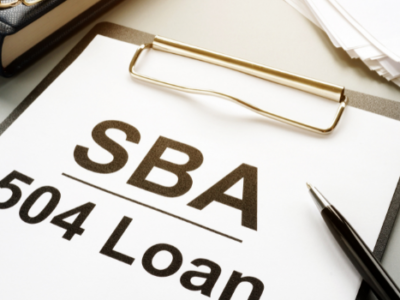Financing for Your Small Business: SBA Loans You Need to Know About (Part II – SBA 504)
March 4, 2022
By Andrew T. Smith
This blog is a continuation of “Financing for Your Small Business: SBA Loans You Need to Know about (Part I – SBA 7(a))“
SBA 504 loans are one of the three core U.S. Small Business Administration (“SBA”) loan programs, which also include 7(a) loans and microloans. A 504 loan can be used to purchase fixed assets that “promote business growth and job creation,” as prescribed under SBA regulations. For entrepreneurs, SBA 504 financing can be an excellent alternative to SBA 7(a) loans.
Established by Congress in 1986, the SBA 504 Loan Program provides qualified businesses with affordable financing for the acquisition of land, or construction and renovation of buildings, machinery, or equipment. With its fixed cost, low interest rates, long terms, relatively small down payments, and backing by the SBA, the SBA 504 Loan Program is an ideal option for small business owners looking to expand their business operations or asset portfolios.
SBA 504 loans require the involvement of Certified Development Companies (“CDC”), which are non-profit corporations that are authorized by SBA to participate in funding federal government-backed loans to encourage small business growth in their local communities. Financing for a typical 504 loan is typically funded from three (3) sources: 10% of the total loan value is paid by the borrower, 40% is provided by a CDC, and the remaining 50% is funded by a banking partner.
SBA 504 loans provide long-term financing up to twenty-five (25) years and their interest rates typically fluctuate three percent (3%). They are unique from other SBA loans, as the SBA 504 Loan Program permits acquisition of real estate so long as the business borrower occupies at least fifty-one percent (51%) of the property being acquired. Aside from real estate and machinery, the loans may be used to modernize existing facilities, private streets, utilities, parking lots, and landscaping. Notwithstanding, SBA 504 loans may not be used for working capital or inventory, refinancing debt, or speculation/investment in rental real estate.
Eligible businesses that might benefit from a 504 loan should speak with a qualified banker at an SBA-approved lending institution. Flint, Connolly & Walker LLP is certified by the National Association of Development Companies (NADCO) to close on SBA 504 loan transactions and routinely advises and assists its business clients through the process.
Andrew T. Smith is an associate attorney with Flint, Connolly & Walker, LLP currently assisting clients in various corporate and real estate transactional matters. He is experienced in a range of legal issues affecting business owners and is knowledgeable in the various federal loan programs available to small businesses and nonprofits. Andrew is NADCO-certified to handle SBA 504 loan closings.

